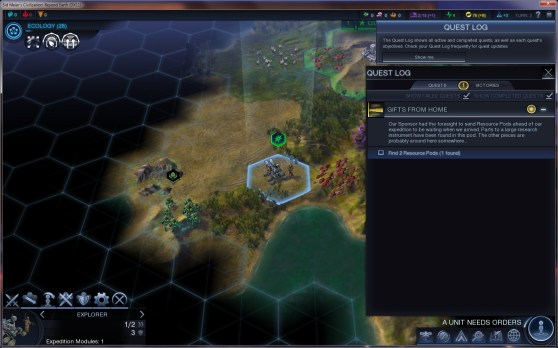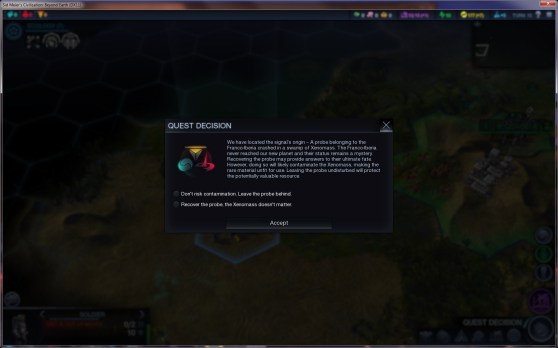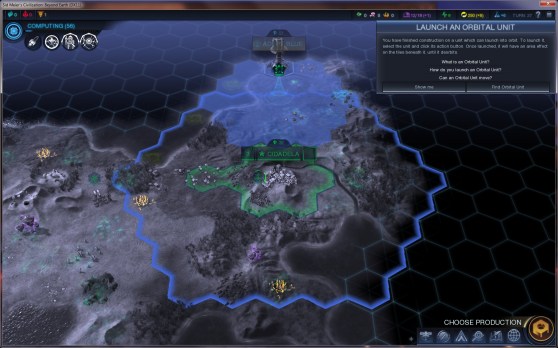And so it would go throughout my colonization efforts. Some aliens immediately jumped on my units. Others would be friendly, or neutral, or shift between feelings about my virtual colonists, presumably as a result of the choices I made.
Discover quests, make tough decisions, and reap the rewards
I kept exploring and found a downed space pod that friends back home had sent ahead, packed with supplies. This brought up the first quest: to find two such pods in the landscape. CBE’s quests ask you to do everything from establishing trade routes to building particular types of buildings to finding things in the game world.
Some are similar to the quests you used to get in Civ V (and still do in CBE) from other cities; many are very different, and they pop up from actions you take, not from a particular NPC. They can award gold, or supplies, or technology, or other bonuses.
A few of the quests were more like achievements in other games – they offered you a reward for doing something significant, such as the first time you down one of the huge diving alien squid-worms that like to eat cities.
Many quests come with decisions: What you choose affects gameplay, the bonuses you get, and even how you progress in your chosen Affinity.
Choose to save the aliens and betray the humans if you like (the aliens are sometimes nicer)
Gameplay gets a lot more interesting when the other human factions start to arrive. This is familiar territory for Civ fans; it’s all the backstabbing, squabbling over borders, threats, trading, and war/peace declarations that you’d find in past games.
The tech web, CBE’s version of the normal Civ tech tree, is also only slightly different from the earlier games. You must navigate through the web, buying each new technology in turn with Science points.
Opening up a new node enables you to drill down to two sub-choices, which cost more than the main nodes but offer some pretty interesting rewards. Ecology’s fencing and Miasma repeller lead to Geophysics for geothermal wells and Alien Biology for miasma immunity and Harmony bonuses, for example. The sub-levels are new for CBE.
Most nodes in the web relate to one of the affinities, but you’ll find yourself taking items from other nodes, too – at a basic level, they’re all useful, offering bonuses to your colony’s Health or Culture or Energy (the CBE equivalent of Civ gold) or Science points.
Each node and sub-level allow you to construct different buildings. CBE has many more building types than Civ V carries, and some of them change your gameplay dramatically.
I researched Computing to build a Spy Agency, for example — because hello, spies are the best part of the Civ V Gods & Kings expansion — and it opened up a Covert Operations menu for me, allowing me to recruit spies and send them on missions in other human settlements, stealing resources or generally causing mayhem. Computing also enabled me to build Missile Rovers, which could shell other cities (and those nasty city-eating worms) from range.
In space, no one can hear you say that everything old is new again
Choosing building options will be familiar to anyone who’s navigated a Civ tech tree before, but there are so many more of them that it starts to feel like a playground.
And that’s the crux of CBE’s initial appeal: Everything’s here that you remember from Civ V. Gather resources, build your buildings, research your new tech, send out new settlers by land or sea to colonize new areas, and try to get along (or not) with the other humans.
But the things you remember appear offer deeper play in CBE, and the new elements, such as that hostile landscape and the ability to throw things into space, seem destined to change your tried-and-true strategies … at least a bit.
Publisher 2K Games provided preview download codes for Civilization: Beyond Earth and download codes for Civilization V: Brave New World and Gods & Kings for this preview.
VentureBeat's mission is to be a digital town square for technical decision-makers to gain knowledge about transformative enterprise technology and transact. Learn More




